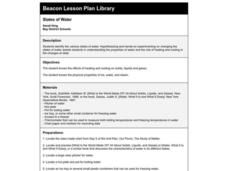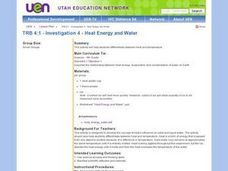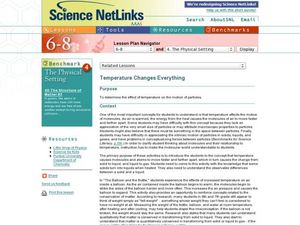Space Awareness
Oceans on the Rise
Temperature rises and land disappears! Through a lab exploration, learners understand the effect of temperature increase on water similar to the effect of global warming on our oceans. As they heat the water in a flask, they measure the...
Curated OER
Air Density and Temperature
Young scholars investigate the effect of temperature on the density of air by putting an uncovered bottle in a bucket of hot water. Then they place a balloon over the mouth of the bottle. They repeat the procedure using ice water and...
Carnegie Mellon University
Bathtub Model
Using a colorful infographic handout and a guide sheet, hold a class discussion about how a bathtub can serve as a model for the greenhouse effect created by Earth's atmosphere. Participants will understand that as energy or matter is...
Curated OER
The Greenhouse Effect
In this greenhouse effect worksheet, students experiment with how the greenhouse effect affects the Earth's temperature by using thermometers, a plastic bag, cans, and water. Students also answer 4 questions.
Carnegie Mellon University
Introduction to Climate
Begin a full lesson on climate change by demonstrating how carbon dioxide gas contributes to increased temperatures. Be aware that pressure inside the antacid-containing bottle in Activity 2 may cause the lid to fly off; keep viewers at...
Curated OER
Lead and Mercury Ion Catalase Inhibition
Students participate in a laboratory investigation in which they observe the effect of temperature and pH on enzyme activity. Students also examine exposure to heavy metal ions and the effect that may have on enzyme activity.
Curated OER
Upwelling in the World Ocean
Here is a fascinating topic: the upwelling of ocean waters. Oceanography pupils learn what mechanisms cause upwelling, types of upwelling, and the effects on marine life. Colorful satellite imagery and informative diagrams bring this...
Curated OER
Connections to Fine Art: What Happens in a Kiln?
In this kiln worksheet, students read about how temperature effects the results of fired pottery. They answer questions using the information and data given.
Curated OER
Testing Water Quality
In this science learning exercise, students test the quality of water taken from a local source and test it in a lab for the ingredients present.
Messenger Education
Design Challenge: How to Keep Items Cool in Boiling Water
Keeping items cool in boiling water... what? This engaging activity challenges high school learners to build a container that keeps butter in a solid state when placing the container in boiling water. Groups use previous knowledge and...
National Park Service
Glaciers and Water
Explore the amazing power of glaciers with a hands-on earth science experiment! After first learning basic background information, learners go on to create their very own chunks of frozen water and gravel in order to observe first-hand...
Curated OER
The Effect of Temperature on Solubility
In this solubility worksheet, students conduct an experiment to see how temperature effects the solubility of salt in water. Students record their data in a chart and then graph the results. Then students complete 2 short answer questions.
Curated OER
Amazing Salt
Students examine the effects of salt on ice. In this salt lesson, students observe what happens to the temperature of ice when salt is added, then make ice cream to see how this knowledge can be used.
Curated OER
The Water Cycle and Global Warming
Students study the flow of water in the environment. In this water cycle lesson students evaluate the consequences of changes in the water cycle using data.
Curated OER
Lake Effect
Fourth graders explore some of the effects Great Salt Lake has on Utah's local weather/temperature moderation, lake effect storms, and temperature inversions. They observe the differences of specific heat between soil and water and...
Curated OER
STATES OF WATER
Students identify the various states of water. They use hypothesizing and hands-on experimenting on changing the states of water, the properties of water, and the role of heating and cooling in the changes of state.
Curated OER
Temperature in the Sun or Shade of the Desert
Third graders use thermometers to measure the air temperature in several
places around the school and then return to the classroom to record the data. They create a bar graph and discuss their findings about the air temperature in the...
Curated OER
Causes and Effects of ENSO
Students analyze monthly sea surface temperature data from the Pacific Ocean to determine if the period is an El Nino or a normal year. They recognize signs to see if there are any patterns that signal either occurrence. Satellite images...
Curated OER
Heat Energy and Water
Fourth graders brainstorm the differences between heat and temperature. In groups, they determine the best way to melt ice without touching the ice. They record their observations and compare them with other groups. To end the lesson,...
Curated OER
Recreating the Greenhouse Effect
Students recreate the greenhouse effect. In this environmental science lesson, students gather materials and follow procedures to create the greenhouse effect on a small scale.
Curated OER
Temperature Changes Everything
Students determine the effect of temperature on the motion of particles. They study the difference between particles in a gas, liquid, and a solid and see how the characteristics of solids, liquids, and gases can be explained by particle...
Space Awareness
Oceans as a Heat Reservoir
Oceans absorb half of the carbon dioxide and 80 percent of the greenhouse gases released into the atmosphere. Scholars learn how and why the oceans store heat more effectively than land and how they help mitigate global warming. Pupils...
American Chemical Society
Molecules in Motion
I heard that oxygen and magnesium were going out and I was like "O Mg." Pupils experiment with adding food coloring to water of various temperatures in order to determine how temperature impacts molecular movement. This is the...
NOAA
The Oceanographic Yo-yo
How does chemistry help deep-sea explorers? Part four of a five-part series of lessons from aboard the Okeanos Explorer introduces middle school scientists to technologies used in ocean exploration. Groups work together to analyze data...

























